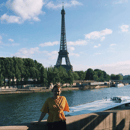Everyone has a unique name that forms part of their special personal identity – you simply wouldn’t be you if you weren’t named what you are. My name, Ausma, is of Latvian origin, meaning, “sunrise.” It was given to me by my mother in remembrance of her own mother, who passed away just three months before I was born.
All my life people have mispronounced my name. Only five letters long, you’d think it’d be easy enough, but few people have gotten it right on the first try… or even on the fifth try. Not only that, but most people can’t even locate Latvia on a map. So, though it may seem silly, believe me when I say it was life changing to visit the country of my ancestors and know that, if asked, anyone on the street could pronounce my name.
Though I’d been wanting to go to Latvia ever since I was a child, this particular year was special. This summer would be Latvia’s 100th anniversary of its first declaration of independence from Soviet Russia in 1918. Independence has always been extremely important to the Latvian people, which is understandable because their land has been exchanged between different regimes repeatedly throughout history. The country enjoyed a brief few decades of freedom after 1918 before being occupied by Nazi Germany during World World II, and once the war was over, they were absorbed into the Soviet Union. After almost half a century of communist oppression, they again declared independence in 1991. This July, having enjoyed freedom for the last 27 years, Latvian people from all over the world would gather to celebrate the centenary of their independence with a massive song and dance festival for one week. I couldn’t miss it for the world. I packed my suitcases and I was off.
Children line up to participate in the opening day parade of the Song & Dance Festival. (Credit: Ausma Palmer)
Upon arriving in the capital city of Riga, I immediately felt a sense of déjà vu wash over me. Though realistically I knew it was just because I’d seen so many pictures of St. Peter’s Church and the Daugava River throughout my life, I genuinely questioned whether I’d somehow visited the city before. When I reached the hotel, my tour guide greeted me, pronouncing my name in perfect Latvian. It was then that I concluded that I was meant to be there at this precise moment. In a way this was my home, simply because it was the home of my relatives and ancestors – this was where I belonged.
Throughout my week and a half in Riga, I ate Latvian food, attended Latvian concerts, and cheered on Latvian tennis players at Wimbledon on TV. I visited the marketplace and for the first time in my life found bracelets and keychains with my name engraved on them. I met my mom’s cousin, Ieva, who helped my mom care for me as a child, and she recounted memories of her life in Latvia under Soviet rule as we walked through the gardens of Rundale Palace.
Riga’s St. Peter’s Church in the sunset. (Credit: Ausma Palmer)
The highlight of my trip came when Ieva suggested we visit the house in the Latvian countryside that my great-grandparents built in the 1930s. She had never been there herself, but she was always curious about it, and of course I was dying to learn all I could about my relatives’ lives, so I immediately said yes.
The house is nestled in a field in the Latvian countryside, at least five miles from the next closest building. When we arrived, we were greeted by the new owner, a German farmer, and his Golden Retriever. The house has been renovated several times, but parts of the original structure still remain. As I gazed out over the lush fields from the back porch, I thought about how the house had stood the test of time. It had survived multiple wars, repeated occupations, and changed hands several times, yet here it still stood. In that way it seemed to be a perfect representation of the Latvian character of survival, and it amazed me to think of all the generations that inhabited the house throughout years of strife.
On the last day of the festival, I stood with thousands of other Latvians from all over the globe, from all different backgrounds, and sang the national anthem as the midsummer sun set. I reflected on all that I’d learned about my culture and my personal history that week, and in that moment, I truly felt that I was home.
Want to keep up with HCBU? Make sure to like us on Facebook, follow us on Instagram, check out our Pinterest board, and read our latest Tweets!



